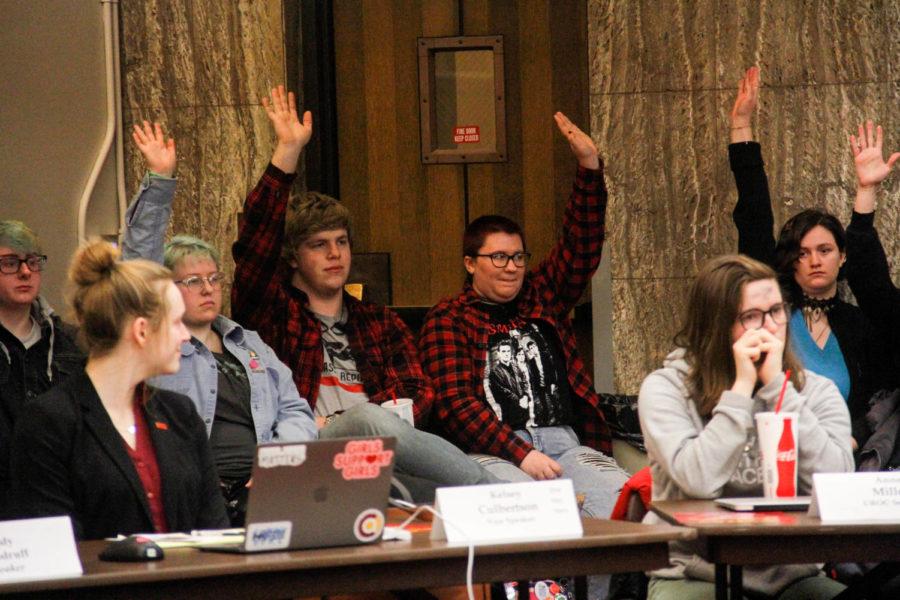Recent events ignite questions about free speech
Members of the LGBTQ+ community raise their hands for recognition during their sit in protest of student government’s Senate Study Bill 1099 during the student government meeting on March 6 at the Memorial Union.
March 14, 2019
Free speech has become a hot-button topic on campus throughout February and March as a controversial Student Government bill, a white nationalist speaker and a variety of other issues have risen at Iowa State.
The Nick Fuentes visit and the Student Government bill re-ignited the common debate about free speech, hate speech and how to find a middle ground — or if it should exist at all.
Various letters to the editor have been submitted to the Daily since these events began in late February, offering a variety of perspectives on the issue. Some suggested that people like Fuentes should be ignored, while another argued that those like Fuentes should be actively opposed with debate.
Recent events have also left many feeling fearful for their safety and that their rights are being challenged.
Taylor Blair, president of the College Democrats, said people like Fuentes are “exhibitionists” and “get off on being controversial, hateful, and terrible.”
Fuentes is not alone as an “exhibitionist.” It is not uncommon for speakers or online personalities to go onto college campuses in an attempt to garner a reaction from students. The most well known of the post-2016 era is Milo Yiannopoulos, who is now a defunct online provocateur, former Breitbart writer and $2 million in debt.
Dozmen Lee, Student Government’s director of residency, agreed with Blair’s analysis.
“Provocateurs are coming here with an ideology of trying to cause problems,” Lee said.
He also noticed a surge of white supremacist posts after the Fuentes visit, specifically under Fuentes’ tweets, live streams and posts relating to the visit.
While many of these posts were made by anonymous accounts, it is unclear if these are Iowa State students, fans of Fuentes, both or neither. The internet allows its users to create profiles on social media sites and give them an anonymous appearance, allowing them to say very controversial things with limited to no consequences.
Lee also emphasized the hate did not arrive with Fuentes, but that the hate was “already here.” Iowa State, like many other universities, has been subjected to white nationalist propaganda on campus as of late.
“The hate is like a gas on campus, and these people that come onto campus are like a fire,” Lee said.
Trinity Dearborn, junior in women’s and gender studies and vice president of Pride Alliance, said the presence of Fuentes and the aspects of free speech activism that bring these figures to campus can be harmful to marginalized people. They said many of their friends had slurs hurled at them and were made fun of for their appearances.
“I respect the right of others to speak; however, that does not extend to making remarks attacking other people,” Dearborn said.
Dearborn, who was at the Fuentes speech protesting, said they were concerned about the cops present at the event.
“[They] were all white appearing during an event which dealt with the sensitive issue of white nationalism, and the lack of visible people of color made a lot of [them] uncomfortable and unsafe,” Dearborn said.
However, people may say things or have opinions that harm others.
“Free expression can cause people to feel marginalized and hated,” said Julie Roosa, an adjunct professor in the Greenlee School of Journalism and Communication and First Amendment specialist.
Roosa said the First Amendment has restrictions in place already and is wary about adding more; however, she believes social pressure and debate from an informed and media literate populace can counter harmful and hateful ideas.
This “social pressure” was present during the Fuentes visit. What was intended by Fuentes to be a closed event became public through the access of information and the application of pressure to hateful ideas. Again, many have questioned whether the methods were effective.
Lee and Dearborn both agreed that Fuentes should not be ignored.
“They don’t go away when they are ignored,” Lee said. “They needed to shut him down and disturb the private meeting. I’m glad the Daily covered him; they should.”
Ashton Ayers, a junior in political science, was also present at the event and has since been reported to Iowa State Police by College Republicans. Ayers said the charge was for excessive attempts to contact the members of the group.
Ayers said this was “an act of intimidation.”
“They are manipulating and using the police to intimidate me after criticizing their actions,” Ayers said.
Ayers claims to have not contacted any of the members on a personal basis and simply responded to those who contacted him or engaged with him on social media.
Ayers posted a series of tweets on his Twitter account in the days after the event that tagged the official College Republican account for Iowa State. He also created a variety of threads with members of the organization filled with discussion of the event.
“The police sought me out for questioning before checking the posts and clarifying the issue,” Ayers said. “They questioned me after midnight, on a school night, for no reason.”
“It’s amazingly hypocritical to complain about free speech then use armed police to intimidate people on campus trying to express their opinions,” Ayers said.
Representatives of the College Republicans did not respond to requests for comment.
Fuentes, a white nationalist and online provocateur, made his way to campus on March 6 for a “private discussion” with members of the College Republicans and the Iowa State chapter of Turning Point USA, a group which is not an officially recognized student organization on campus.
According to an episode of his podcast, “America First,” titled “My Trip to Iowa State,” Fuentes claims he was invited by the leadership of these organizations in secret to avoid any backlash from the public or the press, like he had faced at a previous attempt to speak at Rose-Hulman Institute of Technology in 2018.
However, he claims once the Daily found out about this meeting from a source within these organizations, they all backed out. Yet, he claims members still wanted him to visit the university, so he did.
Both groups have denied any involvement with Fuentes. The College Republicans posted a press release to their Twitter account stating that they did not endorse or invite Fuentes. Fuentes has mocked the statement on his YouTube and claims that it is not accurate.
Another controversy that started this re-ignition was the Student Government bill that aimed to “reaffirm a commitment to the First Amendment.”
The Student Government version of the statewide bill passed with some of the members who voted yes regretting their decision after learning the full contents of the bill. The bill was subject to campus-wide criticism and even prompted a sit-in during a Student Government meeting by members of the LGBTQIA+ community.
Roosa said the bill seemed to reflect the essence of the First Amendment but had “this thing stuck in the middle of it.” She said the section “did not quite fit” with the rest of the bill.
Roosa also said issues such as this put universities in a difficult position of trying to reconcile cases of discrimination while providing an environment that promotes and upholds the First Amendment.
Blair called the bill “broad and dangerous” and said it was “very scary.” Blair said that the controversial section of the bill allowed for discrimination.
Dearborn criticized the legislation during Student Government meetings and in an interview. They criticized the comparison offered by Sen. Madison Mueller that seemed to equate identities with factors such as GPA.
Dearborn also said the bill seemed unnecessary because “all of campus is a ‘free speech zone.’” They also reemphasized the misleading nature of the introduction of the bill and said the process seemed rushed.
Lee also criticized the bill, saying it enabled discrimination and would block entire groups of people from leadership in student organizations.
“It’s disgusting that we would even entertain something like that,” Lee said.
The bill was rescinded in full at a meeting on March 6.






